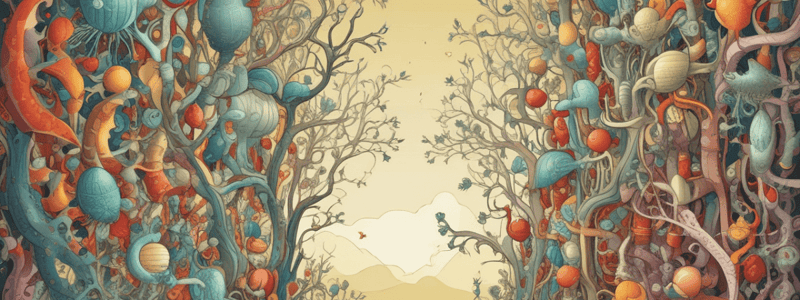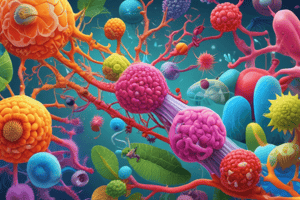Podcast
Questions and Answers
Match the following fields of study with their primary focus:
Match the following fields of study with their primary focus:
Immunology = Study of the immune system Neurobiology = Study of the nervous system Ecology = Study of relationships between organisms and environment Evolutionary Biology = Study of evolutionary processes that shaped life
Match the following biology topics with their respective areas of study:
Match the following biology topics with their respective areas of study:
Immunogenetics = Immunology Neuroanatomy = Neurobiology Population biology = Ecology Speciation = Evolutionary Biology
Match the following biology branches with their specialized topics:
Match the following biology branches with their specialized topics:
Marine biology = Marine organisms and interactions Biotechnology = Application of biological processes Community ecology = Ecology Genetic engineering = Biotechnology
Match the following biology topics with their related subjects:
Match the following biology topics with their related subjects:
Match the following areas of study with their key concepts:
Match the following areas of study with their key concepts:
What was the main consequence of the American Revolution?
What was the main consequence of the American Revolution?
Who was a key figure in the Civil Rights Movement?
Who was a key figure in the Civil Rights Movement?
What was the main focus of the Women's Rights movement in the 19th century?
What was the main focus of the Women's Rights movement in the 19th century?
What was the significance of the Emancipation Proclamation?
What was the significance of the Emancipation Proclamation?
What was the United States' involvement in the Cold War?
What was the United States' involvement in the Cold War?
What was the significance of the Reformation during the Middle Ages?
What was the significance of the Reformation during the Middle Ages?
What was the primary function of guilds during the Middle Ages?
What was the primary function of guilds during the Middle Ages?
What was the characteristic of the economy during the Middle Ages?
What was the characteristic of the economy during the Middle Ages?
What was the significance of the Inquisition during the Middle Ages?
What was the significance of the Inquisition during the Middle Ages?
What was the architectural style that emerged during the Middle Ages?
What was the architectural style that emerged during the Middle Ages?
What was the legacy of the Middle Ages?
What was the legacy of the Middle Ages?
When did the Medieval Period, also known as the Middle Ages, occur?
When did the Medieval Period, also known as the Middle Ages, occur?
What was the socio-political system that emerged in Europe during the early Middle Ages?
What was the socio-political system that emerged in Europe during the early Middle Ages?
What was the main characteristic of absolutism, a form of monarchy?
What was the main characteristic of absolutism, a form of monarchy?
What was the role of the Pope in the Middle Ages?
What was the role of the Pope in the Middle Ages?
What contributed to the eventual failure of absolute monarchy and the development of modern forms of government?
What contributed to the eventual failure of absolute monarchy and the development of modern forms of government?
What emerged as a form of government during the Middle Ages?
What emerged as a form of government during the Middle Ages?
What is inorganic chemistry primarily concerned with?
What is inorganic chemistry primarily concerned with?
What is the primary function of ligands in coordination compounds?
What is the primary function of ligands in coordination compounds?
What is an important application of inorganic materials?
What is an important application of inorganic materials?
What is the primary focus of the study of inorganic polymers?
What is the primary focus of the study of inorganic polymers?
What type of reaction involves the transfer of electrons in inorganic chemistry?
What type of reaction involves the transfer of electrons in inorganic chemistry?
What is the term for a metal atom or ion bonded to ligands?
What is the term for a metal atom or ion bonded to ligands?
Flashcards are hidden until you start studying
Study Notes
Biology: The Study of Life
Biology is the scientific study of life and living organisms. It encompasses a wide variety of topics, ranging from the molecular and cellular level to the ecological and environmental level. Biologists study the structure, function, growth, evolution, distribution, and interactions of organisms, as well as the processes that sustain life.
Cellular Respiration
Cellular respiration is a process by which cells produce energy and release waste products. It consists of three main stages: glycolysis, the citric acid cycle, and the electron transport chain. This process is essential for the survival of all living organisms.
Mendelian Genetics
Mendelian genetics is the study of genetics according to the principles of Gregor Mendel, who is known as the father of genetics. Mendel's laws of inheritance, which describe the way traits are passed down through generations, are fundamental to our understanding of genetics. Mendelian genetics covers topics such as classical and molecular genetics, chromosomal basis of genetics, and variations on Mendelian genetics.
Developmental Biology
Developmental biology is the study of the processes and mechanisms by which organisms grow and develop from a single cell into a complex, multicellular organism. It includes the study of embryology, developmental morphology, and developmental physiology.
Immunology
Immunology is the study of the immune system, which is responsible for protecting the body from infections and diseases. It covers topics such as immunogenetics, immunological recognition, and the immune response.
Neurobiology
Neurobiology is the study of the nervous system, which is responsible for controlling and coordinating all body functions. It covers topics such as neuroanatomy, neurophysiology, and neurochemistry.
Ecology
Ecology is the study of the relationships between organisms and their environment. It covers topics such as population biology, community ecology, and ecosystem ecology.
Evolutionary Biology
Evolutionary biology is the study of the evolutionary processes that have shaped life on Earth. It covers topics such as the theory of evolution, speciation, and the study of fossils.
Marine Biology
Marine biology is the study of marine organisms and their interactions with the marine environment. It covers topics such as marine ecology, marine physiology, and marine conservation.
Biotechnology
Biotechnology is the application of biological processes and organisms to develop new products and technologies. It covers topics such as genetic engineering, bioprocessing, and bioprospecting.
In conclusion, biology is a vast and fascinating field that covers a wide range of topics. From the smallest cells to the largest ecosystems, biologists study the wonders of life and seek to understand the processes that sustain it.
Studying That Suits You
Use AI to generate personalized quizzes and flashcards to suit your learning preferences.





